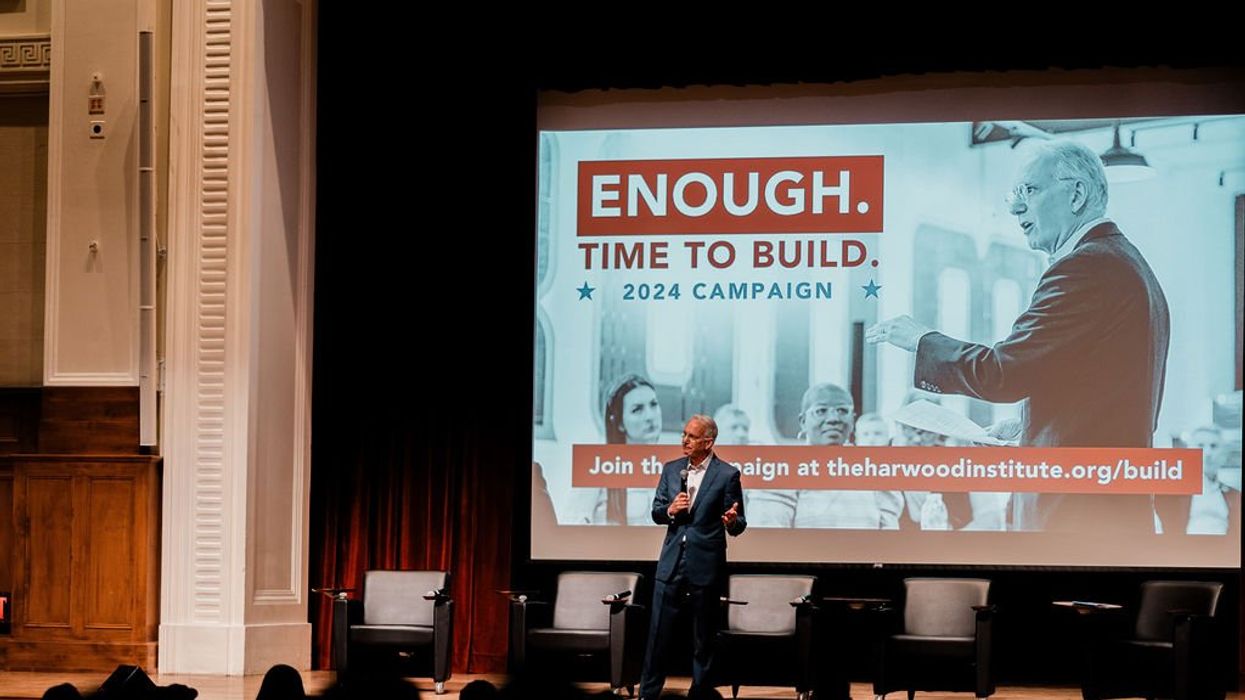This is the first entry in a series from Rich Harwood, president and Founder of The Harwood Institute. His “Enough. Time to Build.” campaign calls on community leaders and active citizens to step forward and build together.
In America today, our collective challenges are mounting. Inequities and disparities are growing, not diminishing. A lack of trust has turned into pervasive mistrust. Hope is in short supply. Meanwhile, election season rhetoric is already tearing communities apart, not building them up. And there’s a vacuum in our public square being filled by the most divisive voices.
It can feel so hard to get things done these days. Even our own allies at times create obstacles. So many of us are tired, worn down. A growing number of leaders tell me they are on the verge of giving up. In the face of all this, it’s no wonder so many community leaders have taken cover and stepped back for fear of being attacked.
The question becomes, how do we move forward together under these conditions? I believe we can only move forward by going together.
Indeed, there is a practical path forward, a way out of this mess. It’s time to call on community leaders and active citizens to declare, “Enough!” Enough hate, division and fear. Enough hopelessness. And it’s time to build together. To get moving. That’s what my new civic campaign — “Enough. Time to Build.” — is all about and it’s what we’ll be exploring in this new series here at The Fulcrum.
This campaign is moving across the country throughout 2024 and into 2025 — from California to Florida, New Mexico to Michigan, Colorado to North Carolina, and everywhere in between. Wherever we go, we’re going to highlight a new, can-do narrative from the frontlines, starting with our first event of 2024 in Flint, Mich,, on Jan. 17. Expect inspiring stories of community builders already taking action to practical steps for you to fulfill your community’s shared aspirations. We’ll also convene new virtual spaces to connect community leaders to one another and renew a sense of possibility — so no one feels that they are going it alone — alongside offering our road-tested tools for accelerating your community work.
For over 35 years, I’ve worked to transform America’s hardest hit communities. My “Turning Outward” approach to community-led, community-driven change has spread to all 50 states and 40 countries. I’ve been recruited to solve some of the most difficult problems of our time, including being called into Newtown, Conn., after the massacre at Sandy Hook Elementary School. My experience, and my reading of our country being in a truly historic moment, has convinced me that we need a distinctly civic message — not a political one — to bring us back to our shared public lives. In fact, the tens-of-thousands-strong network of community leaders we’ve built over the decades has been looking to us for this very thing.
So this election season, while I’m not running for office, I will be traveling the country to show communities a real pathway forward. Not with a utopian vision, false promises or comprehensive plans. Instead, this campaign — and the stories from communities all over this country that we’ll be telling in this new series — are meant to bring more Americans together to build. Brick by brick, neighborhood by neighborhood, community by community.
This requires that we reclaim the public square from the most divisive voices and unleash our individual and shared capacities as builders and doers. The loudest voices have a right to be heard, but they don’t have a right to dominate. We don’t need more political division and distrust, we need a civic path forward. The change people yearn for — a deeper sense of connection, belonging and dignity — is going to start in our local communities and spread from there.
I know we can create authentic hope this election season and beyond. Our five-point platform illuminates how we can begin building communities that work for all of us, not just some of us.
- The country is not where we want it to be. But we cannot wallow in despair. It’s time to build.
- There’s a vacuum in public life. The public square is dominated by the most divisive voices. It’s time for community leaders and active citizens to step forward.
- Americans are builders and doers. It’s time to unleash this capacity and go together.
- Real change always starts in local communities. Starting local is the best way to demonstrate progress and spread real change across the nation. It’s time to grow belief in one another.
- Good things are already happening in our communities. We can build on them. It’s time to accelerate and deepen these good things.
Together, we can restore our belief in one another, renew authentic hope and create the real change that our communities — and our country — so desperately need. Enough. It’s time to build.




















Trump & Hegseth gave Mark Kelly a huge 2028 gift